Button Shy Games is known for pushing the envelope. Here at Meeple Mountain we’re big fans of their small designs. But their most intriguing game to date isn’t found on any retail shelf or even in their webstore. That’s because it’s a Patreon exclusive, available only to members of the Board Game of the Month Club who plunk down their dollars every month for the privilege of discounts, print-and-play files, early access to games, and — most importantly — the sort of small-batch titles that Jason Tagmire excels at publishing. [Since this article’s publication, a free print-and-play version of Personal Space has been made available at PnPArcade. Players using this version will need to join the game’s Discord server in order to receive some of the customized elements.]
Personal Space, available to Patreon backers at least through the end of 2020, is one such game. That’s putting it mildly, though, because Personal Space feels like a revolution, an unexpected sea change in what board games are. I’ve personally never played anything quite like it. For those who won’t have the chance to try it out, let’s take a look at what makes this one so special.
What Is Personal Space?
Personal Space is a solo-only game about managing a planet where each player’s experience is unique to them. It’s also a legacy game where players make permanent changes to their corner of the galaxy across multiple play sessions. There’s an RPG component, with players choosing how their character feels about their world and which activities they prefer. It has technological and social aspects too: the digital rules are enhanced through the use of QR codes and players regularly interact with each other — as well as receive game updates — through the official Discord server. Above all, Personal Space is a sandbox game, the kind of title where players get a handful of tools to use as they please.
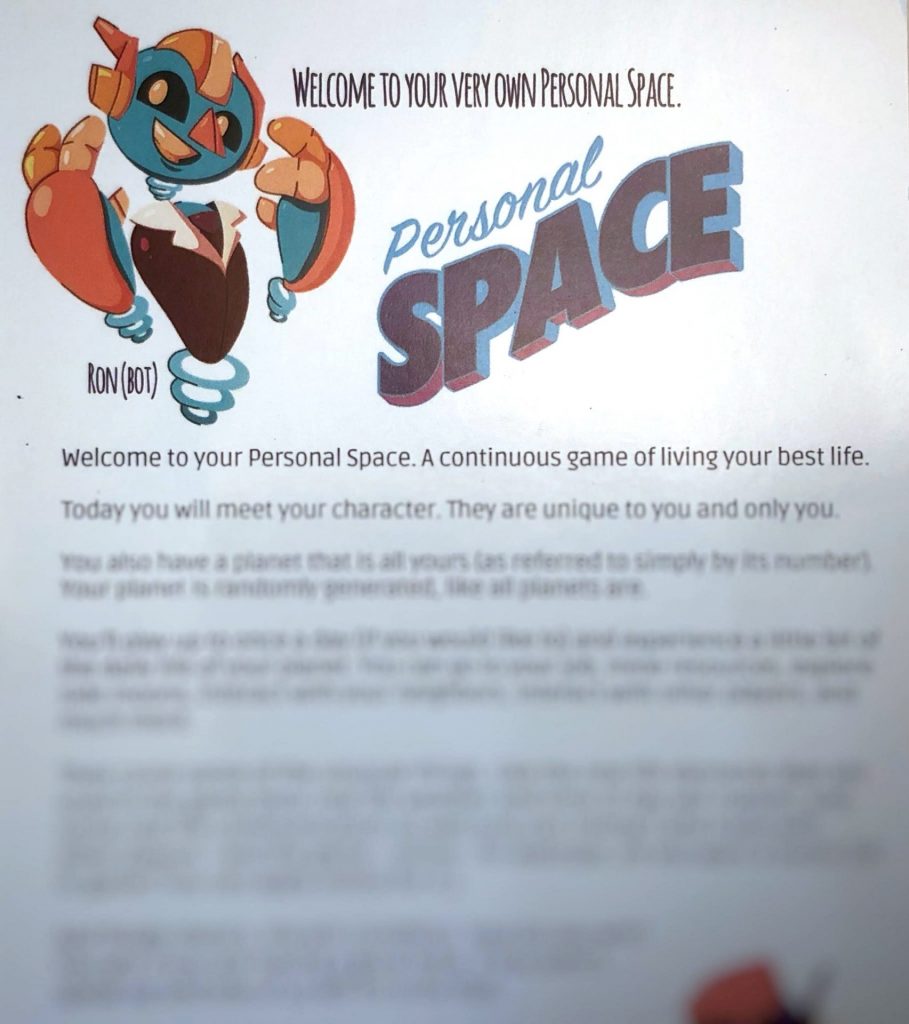
For people my age, the reference points may be clearer than the genres. The Sims, Second Life, Pokémon Go, Animal Crossing, Stardew Valley: these are all part of Personal Space’s lineage. Video games have excelled at providing these virtual worlds for years, but the tangible components and immediacy of tabletop gaming have never lent themselves to that kind of open-world play. Board games have always had endpoints, decisive outcomes, winners and losers.
Until now. Personal Space is a daring attempt to replicate that open-world feel in cardboard. And if you haven’t guessed, it absolutely hits that mark.
How to Play Personal Space
A game of Personal Space starts with an envelope. Each envelope contains an assortment of goodies: a hand-numbered planet board, a sticker sheet, a few papers for tracking information, and plenty more. Most importantly it contains a card bearing the unique alien who will serve as your character.
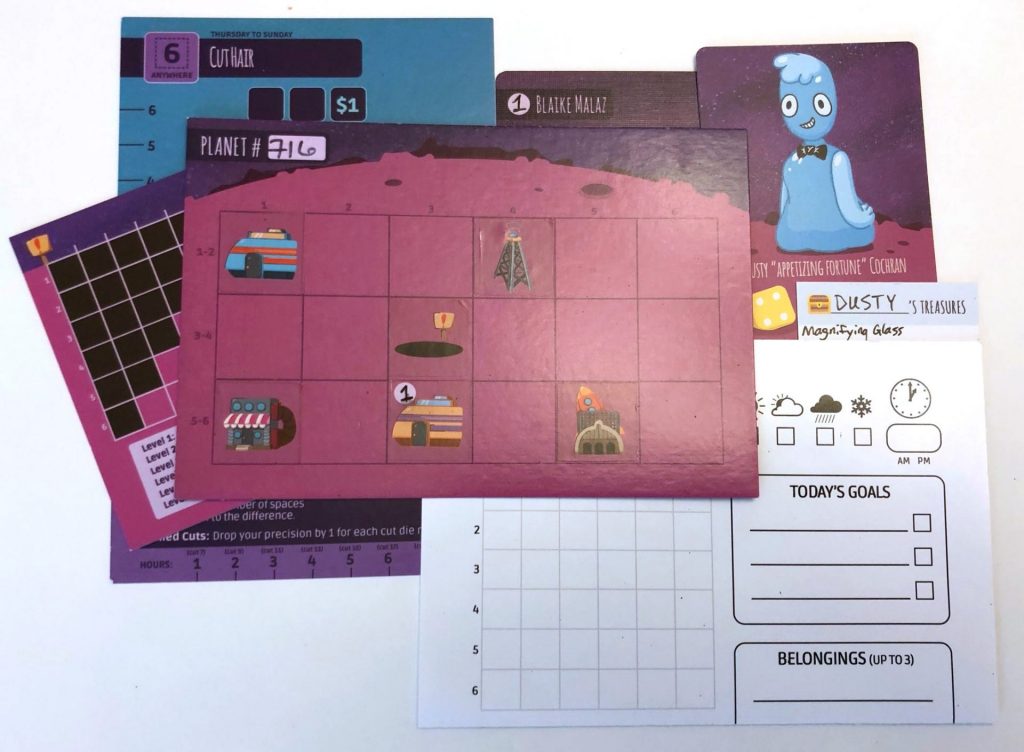
Setting up the game for the first time is a relatively quick one-time process. Roll a few dice, place stickers according to the instructions, and within minutes you’ve got your own personalized planet. The stickers include things like your character’s house (where you start each day) and their workplace as well as a geographic feature that will be used to generate additional resources. Once the game is set up, you’re ready to play your first session.
One major note before you start playing: every session of the game represents a day in the life of your character and you can’t play more than one day at a time. You can play as long as you want during each session — the first few took me roughly 60-90 minutes each — but once you pack up for the day, you’re done until tomorrow. Like almost everything about Personal Space, this mandate relies on the honor system to be enforced. There’s no real way to stop cheating, yet the rewards for meeting certain goals are so small and the community is so supportive that there isn’t a good reason to break the rules. Playing within the “one session per day” constraint is a lot more fun.
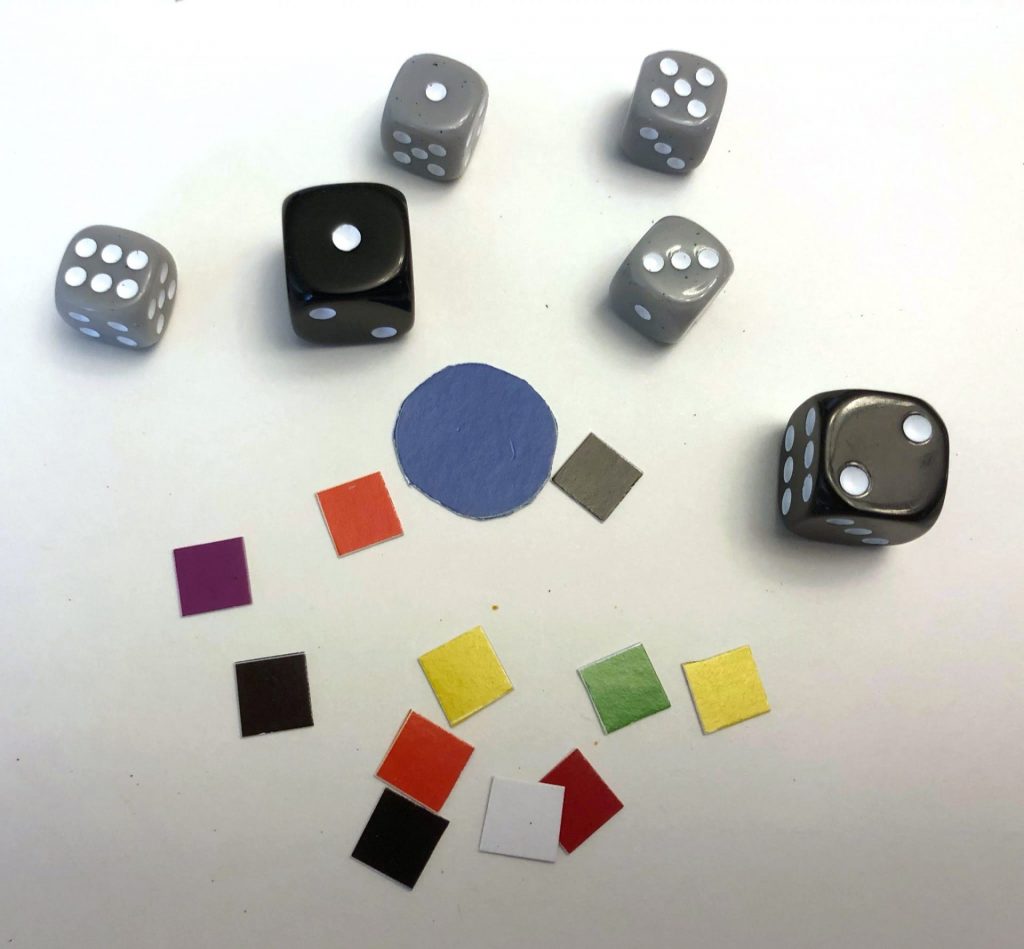
The real-life weather and time will have an impact on your game as well. Some options are only available at certain times or on certain days. Work hours, for example, are determined by the day you play; my character works Thursday to Sunday. Each time I play on one of those days my character has to go to work, though I’m free to take other actions before and after. Ideally players will want to set aside 20-60 minutes every single day to check in on their planet, but thankfully there’s no rule requiring it.
At the start of every session, the player will roll 6 dice to determine their initial stats for the day. Each stat shapes the day’s experience: a lower Speed might make moving around the map more tedious while a high Brainpower will allow the player to manipulate dice more effectively. These stats will change throughout the day.
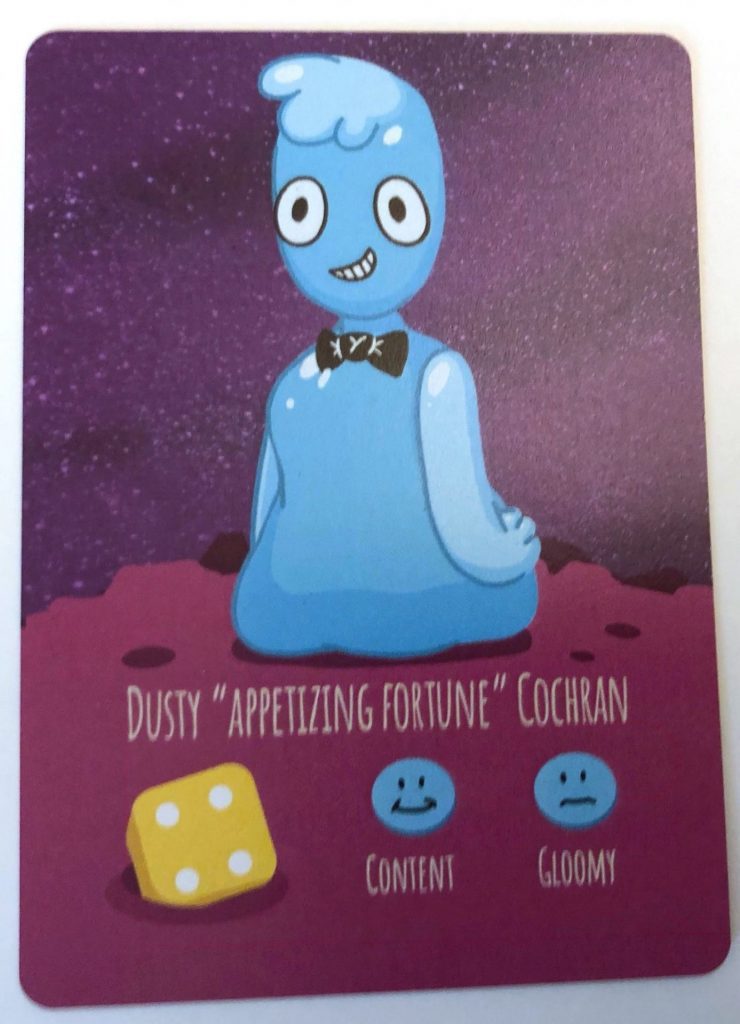
During a session, the player will take various actions with their character. These can range from simple actions like moving or eating to more complex ones like stargazing (one of the various hobbies that characters can practice). For each action, the player will add one or more boxes to their 6×6 grid. A running log of the day’s actions is kept as well. Once you hit 18 actions or fill every square in the grid your day is over, though you can also quit early if you want.
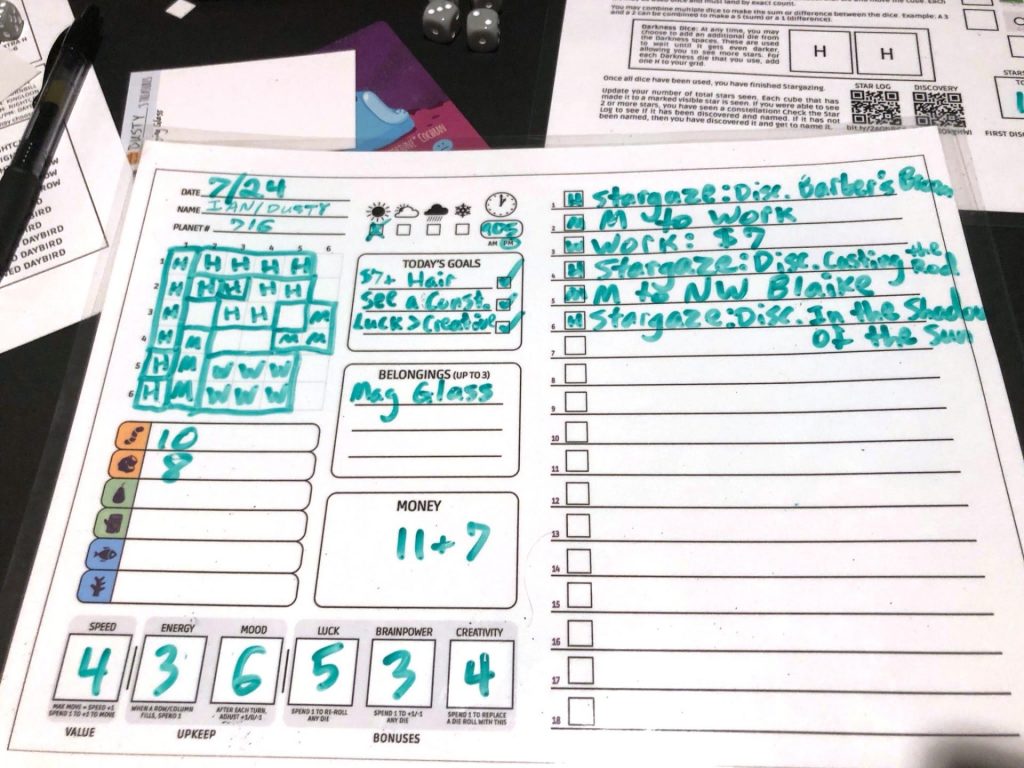
Many of those actions open up more opportunities. Moving, for example, can be used merely to get from home to work but it can also be used to set up a birdwatching action (by placing a bird feeder along your route) or combined with exploration in the hopes of finding treasure. You might move to a neighbor’s house in hopes of finding them at home; if you come across them, there’s a QR code to scan to see what they have to say. You could move to the Internet tower to contact the store and buy one of the two items listed for sale that day.
There are also minigames for the player to attempt. The three main occupations are each resolved through a small minigame of rolling dice and moving cubes. It’s here that the stats are most commonly used, as several allow you to manipulate dice. Same with the resource-generating geographic feature that each character begins with. The hobbies and events that have been introduced so far add even more complex (and optional) minigames for players to test themselves against. Personal Space is a living game so the content is only increasing as time goes on.
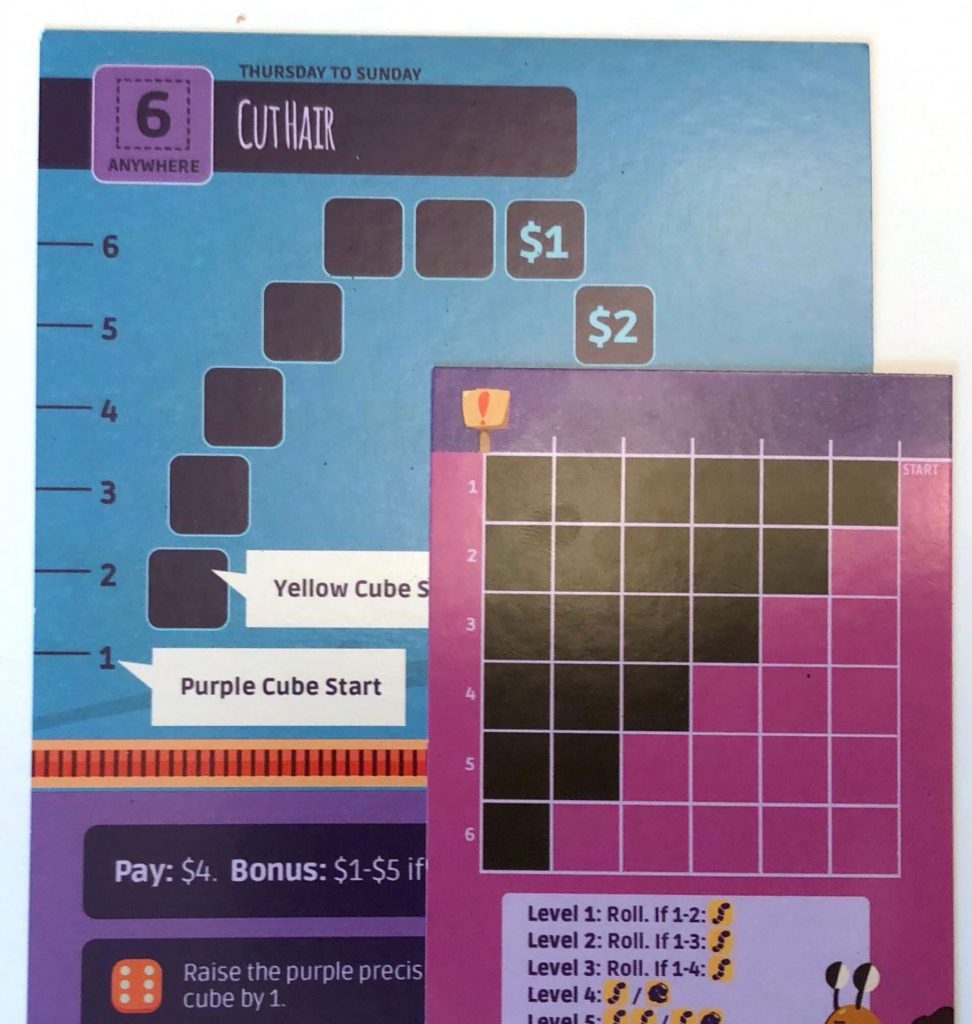
Blending Genres
Actually playing the game for the first time is a bit daunting. Personal Space has options galore and it’s tough to know where to start. One of the nice touches that put this game a cut above the rest is the addition of Goals. To begin every session, the player chooses up to three Goals to achieve. These can be anything. In my first few sessions I’ve had Goals as varied as “go to work”, “win the lottery”, “pick up three worms” and “catalog a word”. The Goals you choose are for you and you alone; there’s no reward for success or penalty for failure. Weirdly, this lack of consequence makes them feel more important. The thought of not meeting one of my Goals makes me as a player feel sad, let alone the impact it might have on my favorite character stat: Mood.
Unlike the other stats, which have clear rules around when they increase or decrease, Mood changes after any action where you think it should. That’s such a delightful concept, unique among the board games I’ve played. This is one of the areas where Personal Space feels more like a roleplaying game than a board game, as RPGs have been incorporating rules like this for quite some time. It has lovely consequences in play too: on a day where I chose the goal of “end with Mood at 6”, I ran into my neighbor and was absolutely dismayed to discover that he’d forgotten me, cracking the same joke he had when we first met. My Mood dropped. I spent the rest of the session trying to recover from this slight, focusing on things my character might enjoy rather than simply stockpiling resources.
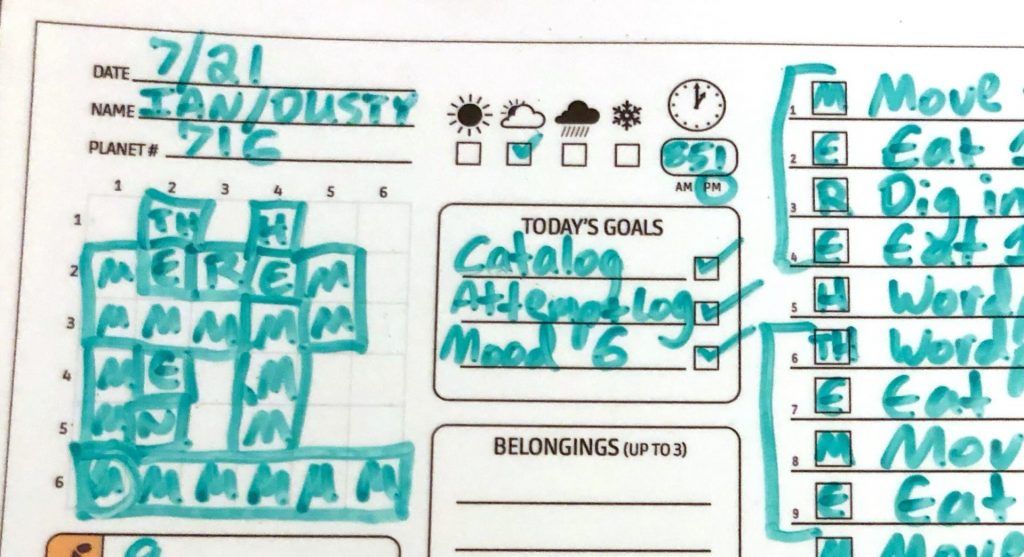
At the end of each session, players mark certain key things to track for the next game. Money, for example, is kept from day to day and has a tangible use in game. Mood is tracked, as are the number of goals achieved, but those don’t move forward; it’s only a record of what that day felt like. Sometimes I don’t carry over as much as I might like. Instead of digging for worms I spend my time looking for buried treasure. I discover new words (part of the Wordplay hobby) and add them to the global dictionary, a spreadsheet maintained by Jason Tagmire and updated by the community of players.

These moments are special to me not because of the numbers that increase or decrease over time but because of the stories told each day. What makes Personal Space so amazing is the way it makes room for these stories without explicitly creating them.
And while it might seem like a solo game would leave those stories untold, the Discord server is full of lively chatter every day: celebrating lotteries won, commiserating over poorly rolled dice, marveling at a well-arranged grid. There are also waves of new content — moons to visit, new hobbies to enjoy, items to buy — rolling out at regular intervals to challenge and delight players. That community element is central to the experience; we may be playing on our own, but we’re all in it together.
It’s hard to describe Personal Space as anything but, well, personal. This is an intimate, unusual game that doesn’t quite fit squarely into any one category. While it may be part of Button Shy’s Board Game of the Month Club, Personal Space feels much more like a contender for Board Game of the Year.
Note: Because of Patreon’s billing structure, a patron joining the Board Game of the Month Club will be added at the first of the following month. Since Button Shy is a small publisher this can sometimes lead to delays in receiving product. However, the BGotMC is full of other offerings to enjoy while you wait.


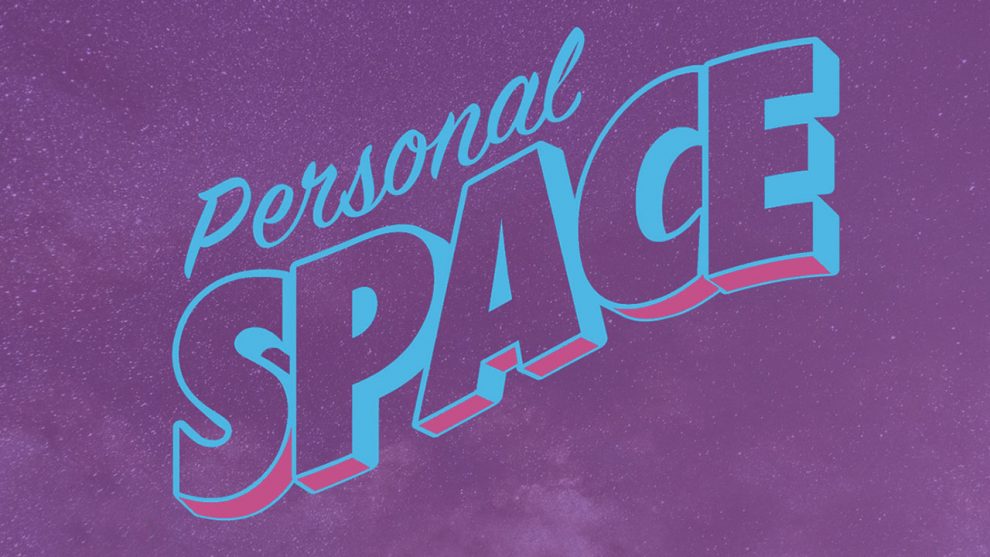
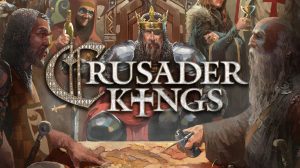
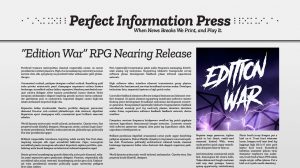
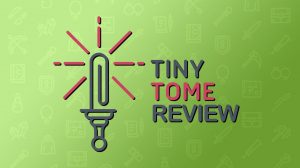





Thanks for this review. I was just scouring the internet for more info and found it. Wow, the mini-games look great and the idea of new things arriving each month sounds fantastic – Especially right now while we’re locked down (at least in California). A small/cool legacy game that you can play some every day sounds really appealing to me.